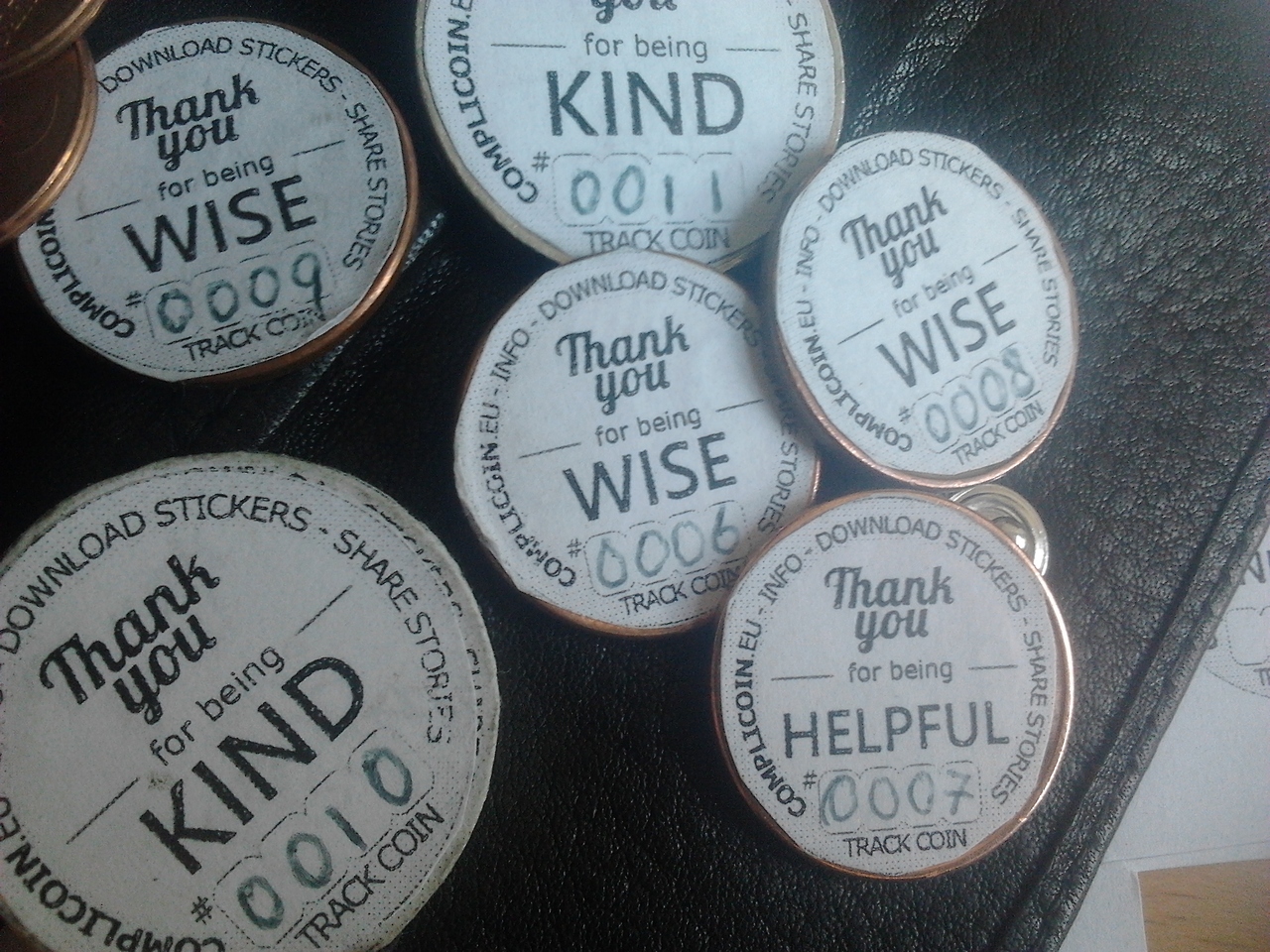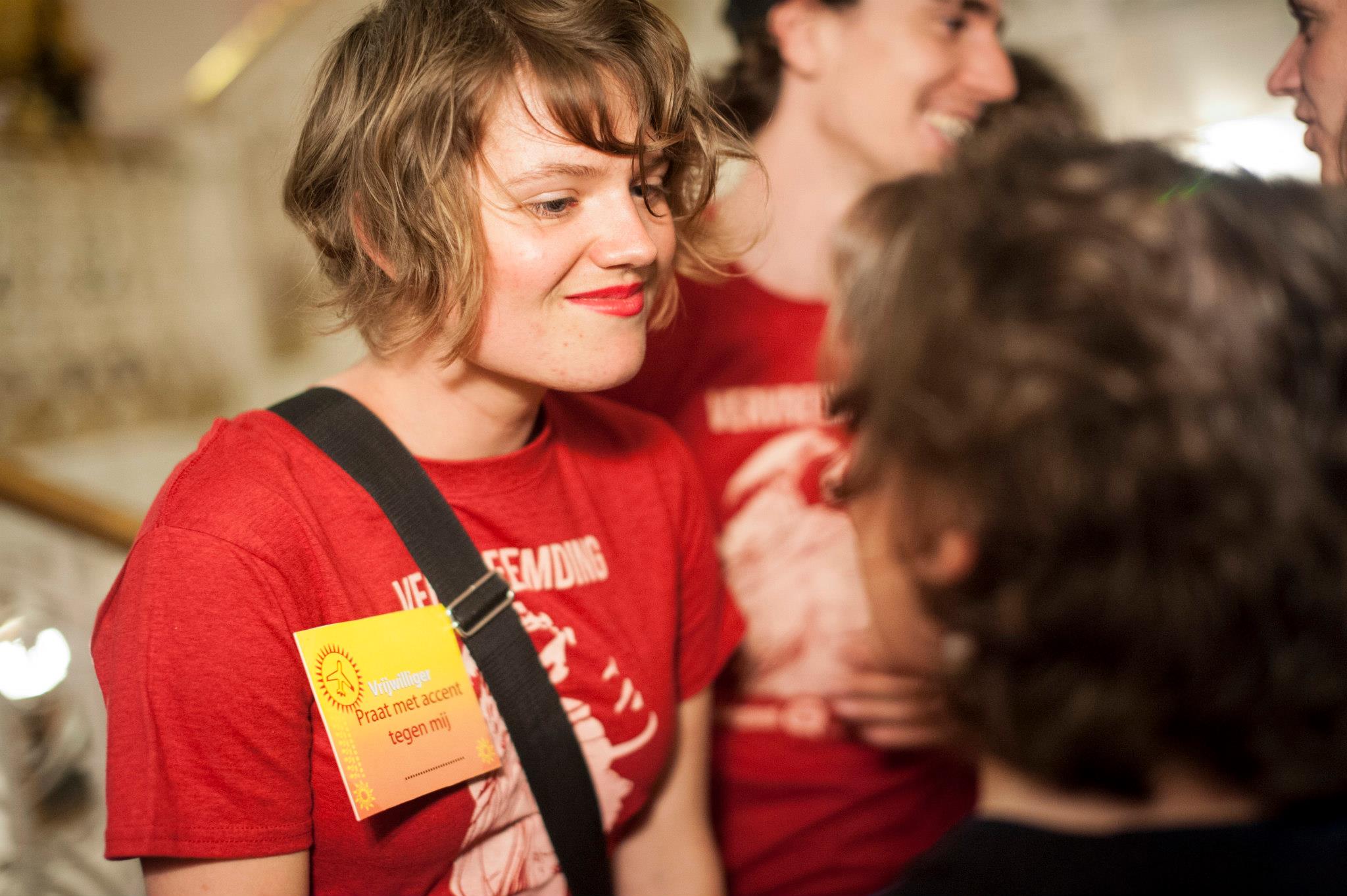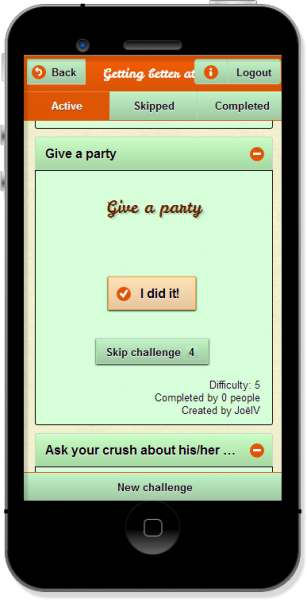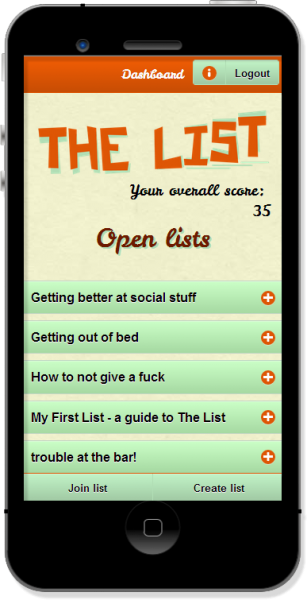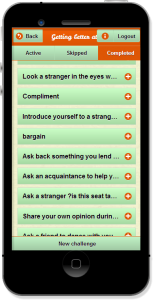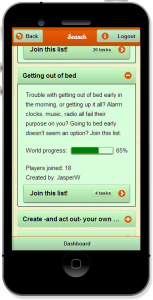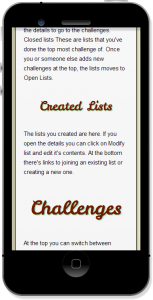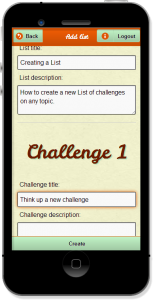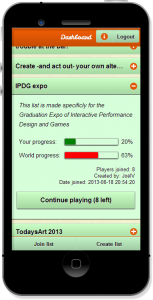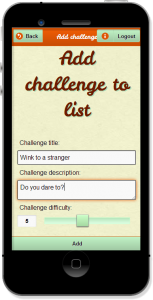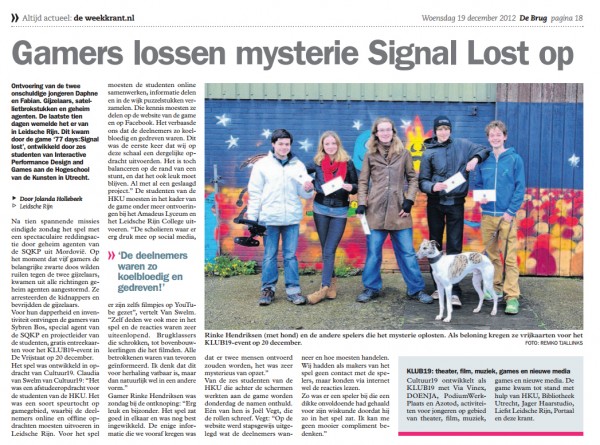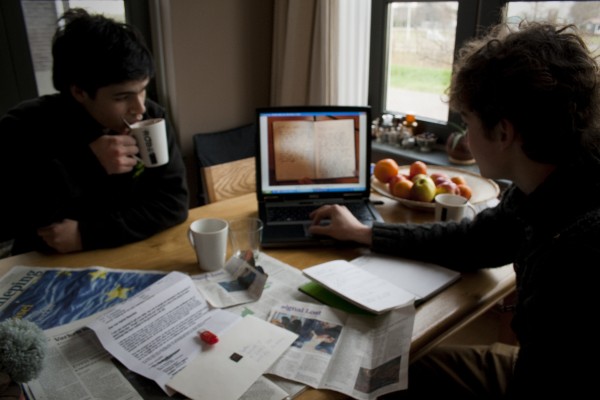Greeting Gurus
Meet new people in surprising and fun ways, break social barriers and win prizes. Greeting Gurus is a simple social game that can be played at any festival, congress or other social gathering.
The List
visit the project: www.openthelist.com
Graduation project 2013
I am looking for partners for this project. Do you want to get involved in any way? Please contact me. I’m specifically looking for people with knowlegde in:- Programming: PHP, MySQL, Javascript, app development.
- Social media (Facebook) integration.
- Bussiness opportunities, development deals, promotion
Taken from the website:
The List is a platform where you can gather small challenges on a List that bring you closer to a bigger goal. Do the challenges in real life and improve yourself. But you’re not alone! Everyone can join your List and add new challenges to it, just as you can join other Lists and surprise people with new challenges.
Every time you get a new challenge, it’s a bit more difficult than the previous one. Just like in a game. Because we know how difficult each challenge actually is.
Mission
I want to turn life into one big multiplayer game. I want to make daily life more playful and play more meaningful. I want to help people grow personally and socially, in a playful way.
Principles of The List
Anyone can create a List of challenges on any topic. When someone joins a List, they see only four challenges at a time so they focus only on achievable things. When you did a challenge in real life you click the “I did this!” button and a next challenge becomes available.
When you join an exsisting List, we present you with two challenges of that List and ask you if that would be hard or easy for you to do. That way we can determine your starting skill level and start you off with challenges that are both realistic and not to boring for you.
For every four finished challenges you get a Joker. You can use those to skip challenges.
You can leave a comment about your experience when you finished a challenge. Social interaction is the first thing that will be expanded in the future.
You can view all the challenges you accomplished and redo them if you want. Practice makes perfect.
The site is aimed at smartphone use for easy accessability during your daily life. An actual app is very high on the wishlist.
You can add challenges to any List that you or someone else made. That way there is always room for development: when you reach the end of a List, you can simply add new challenges that other people can do too.
Development of the project
This project started out as a game for singles to find true love. By giving them challenges to do in their own daily life I wanted to encourage them to break social barriers and become more assertive. I spoke with a psychologist and read a lot about social development, self improvement, flirting and social anxiety. One way therapists help people overcome their fears is by exposure therapy: actually doing what you are afraid of. One small step at a time.
Challenges
There are quite a few challenges I took on with this project and I haven’t tackled them all. That’s why this project isn’t finished yet.
- I do not control the situation the game is played in.
Nor do I want to. The game has to be flexible enough so anyone can play the game in their daily life. This is achieved by making the platform crowdsourced. So anyone can create a List ideal for their situation. Players are encouraged to create challenges that apply to other people as well. The player can also skip challenges that do not apply to their situation. - Every players skill level is very different.
This is solved by the test that defines the players starting level when they join a List. - I am not present during the playing or even testing.
In the backend I gather as much data as I can about the players. During testing I work with quality interviews and questionnaires before and afterwards.
Lens
Project Lens is an urban game for two players. Using simple technology, ones fate is put in the hands of the other. They have to work closesly together to difuse the bomb.
Played at
We were invited to organise this game in 2010 at the LAU International Theatre Festival in Beirut, Libanon. You can see a compilation video of the trip here. It also includes some gameplay.
We also played this game at:
|
2010, june 26 |
Fruitfest |
Utrecht, Netherlands Utrecht, Netherlands Utrecht, Netherlands Utrecht, Netherlands Utrecht, Netherlands Den Bosch, Netherlands |
The story
We invented a company called Cerberus Defence. This is a military research company that specializes in the appliance of digital technologies in a military environment.
They developed Project Lens as a way to prevent or reduce posttraumatic stress disorder under soldiers caused by seeing horrific things on the battlefield. With this method, the soldier in the field will never see the traumatic things around him. The soldier in the command post does see them, but only on a screen. People nowadays are used to seeing the most gory things on a screen, without having any trouble sleeping at night.
Project Lens is offered on festivals and such to promote the company, and to get back a lot of test results.
Designing the game
The assignment for this project was to make an urban game. That is a game that can be played outside, in the public space. We experimented a lot with different concepts. One of them was just blindfolding someone and then guiding them through the streets. This proved to be exciting as it was, but we wanted to add an extra element to it. So we decided to separate the guided and the guide as much as possible, with the addition of laptops, headsets and a camera. To make it a more complete performance we added the military setting. For me, this project really proved that a very simple idea can be enough to build a succesful game. I also learned that testing a lot often provides great material.
My role
There were no clearly defined roles in this project. We all worked on the concept and game design. I ended up making the corpse and most of the graphic work, including the logos. After the project I edited the video.
About half a year after the project, I rebuild the technical part from scratch in Max/MSP together with a former classmate that wasn’t on the project before. I also designed new computer graphics. Together with one of my teammates we made the “bomb” that sends feedback back to the command post, using a disassembled keyboard.
Voorbij de Poort
Voorbij de Poort is an interactive play in a museum for families. The children get split up from their parents for their own tour, when suddenly the parents go missing. They’re trapped in the statues and paintings in the museum! It’s up to the children to find out what happened and rescue their parents. Maybe the young girl that lived here a long time ago has something to do with the magic disappearance.
Parents cooperated behind the scenes, recorded pre written dialogue and posed for photos which where used in the play.
De Kapel
De Kapel, Dutch for ‘The Chapel’, is a participatory theatre play in which the audience takes on the roles of different parties in a fictional rehabilitation centre.
This fictional rehabilitation centre is disguised as a pitoresque village within the canals of a fortified island. Antisocial members of society that are a burden to their neighbourhood get relocated there so they won’t be bothering anyone anymore. This is actually a political concept that is realised in at least several European countries.
The audience gets divided in three groups. One group takes on the part of patient, one group is the staff of the centre and the third group will play themselves and form the ‘external commission’.
It’s a special day for the patients and staff in The Chapel. Today an external commission is coming, consisting out of representatives of society. They will each observe one of the patients and advice the rest of the commision on the question if the patient is ready to leave the rehabilitation centre and return to society. It’s up to the patients to be on their best behaviour. The task of the staff is to ensure only the patients that are really finished with their treatment are let go. Some staff members might just have formed a bit too much of a personal and informal connection with their patients and aren’t ready to say goodbye just jet.
This location theatre play is a complex choreography of guiding three different groups that observe eachother, form opinions based on dossiers, fill out bureaucratic forms and make moral descisions at the end.
The groups of patiens and commission members are partly guided by immersive audio monologues that spin the story from a very personal perspective.
Made by ten students of the Utrecht School of Arts. I was resonsible for a large part of the interaction design and I did the visual design.
To view the graphic design work I did for this project click here.
A video compilation of the complete play in Dutch.
Signal Lost
A live action game in which teenagers have to rescue two kidnapped youngsters by locating pieces of a satellite that crashed in their neighbourhood.
Graduation project 2012
Project websites
www.77-days.com
www.signal-lost.com
Description
On a normal day in December, two youngsters got kidnapped out of two highschool cantinas in Leidsche Rijn, a new neighbourhood in Utrecht, The Netherlands.
What followed was a ten-day online and offline search for the victims and their kidnappers. Why where they kidnapped? What happened? What where the looking for? The local teenagers had to work together to connect the dots that where live acted events, hidden artefacts, websites, social media accounts and other media.
The project was a promotional campaign for the cultural youth club Klub19, a part of Cultuur19.
I was lead game designer on this project.
Team
Sybren Bos
Tamarah de Jager
Sem Kok
Reno Nordkamp
Mirthe van Merwijk
Joël Vegt
Client
Cultuur19

